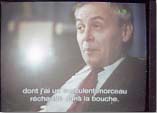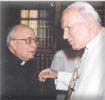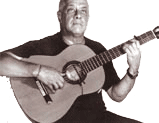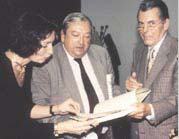|
Jacques Lacarrière
A friend of Frédéric de Towarnicki, author of magnificent books on The Gnostics and on Greece in all of its aspects, in love with poets and Burgundy (the area but also the wine), Jacques is one of those non-standard and off-the-wall writers with a “flowery word” and “winged speech”. After having seen my film on Alan Watts, he sent me once a wonderful letter :
Sacy, 30 août (1973)
How amazing was your piece on Alan Watts, just, sober, intense with, from time to time, the real pleasure of guessing, behind him, your Nirvanian figure.
Never listen to what the wicked wolves in the Parisian sheepfolds are saying: you see and you feel right, just listen to yourself and those, like me, who love and admire you, from far away. As for me, I just love beauty and truth, wherever they may be, and particularly when they have your face. Sylvia wants also to kiss you tenderly.
I send you this letter with the first winds of Fall : this morning, they woke me at dawn and I walked at the edge of forests, thinking that, somewhere, on the hard crust of dreams, you survived. I hope that this message will transmit to you my tender memory and my desire for us to see each other more often, for a real talk. Numerous are the roads in the labyrinth, the longest roads leading to the enclosed room where dozes not the Minotaur, but the chrysalis which, very soon, you will be no more.
Jacques Lacarrière
Ronald Laing
 Ronald Laing (1927-1989) was one of the travelling companions of Anti-psychiatry (which was often extreme, especially in Italy with Basaglia). In 1960, he published The Divided Self, and, in 1967, The Politics of Experience – a best-seller, with several million copies sold. He also published his autobiography, The Making of a Psychiatrist, in 1985. Ronald Laing (1927-1989) was one of the travelling companions of Anti-psychiatry (which was often extreme, especially in Italy with Basaglia). In 1960, he published The Divided Self, and, in 1967, The Politics of Experience – a best-seller, with several million copies sold. He also published his autobiography, The Making of a Psychiatrist, in 1985.
For him, madness can be a creative answer, fitting with the world around. Above all, he wrote, in Knots, strange and beautiful poems on the devastating double bind, source of madness, the best example being a mother asking her son to come and kiss her … and, in the meantime, pushing him away roughly, because he is too brutal, she says. For the Express, Magazine, I went to London to do an interview with him. It was quite surrealistic, in the way he stopped talking after every three phrases or so, or even in the middle of a phrase, for half-an-hour maybe, and then carried on with the conversation, with such a Scottish accent that, inexperienced in English, I understood only one word in five and just guessed the general sense of what he said! But he had such an aura of light and charm, such a comical way of looking at you like a child, such a way of imposing his internal world, more real and present than he could describe, that it worked. I saw him, later, with the same pleasure, not understanding a great deal, as usual, because he interlaced his discussion of the concepts of metanoïa - or an internal journey due to regression to a level of experience preceding acquisition of the distinctions between past and present, reality and realm of fancy, and so on – with analysis of texts by Sartre, Husserl or Camus. What touched me, first of all, was his clairvoyant nature, his prescience of Eastern spirituality, the part of himself which communicated elsewhere and in another way with people. But the message was often muddled. Nevertheless, so many brilliant moments and dazzling ideas !
David Landes
Historian of Economics at Harvard University, author of Bankers and Pashas in Egypt, David Landes recently published a best-seller on Richness and Poverty of Nations, where, among many other fascinating notions, he established a parallel between the way women are treated and the economic level of a country. It was Jacques Le Goff who introduced me to him at the time of our project on The Epic of Western Culture. David was a member of the jury for my Ph.D.
Père Georges Lapouge
Abbott Georges Lapouge, born on the 8th of September 1914, became a friend of my father, long ago, at the dinners of the Amitiés de la Résistance (“Companions of the Resistance”). They liked and admired each other very much. In a way, one could say that my father ‘bequeathed’ me to the abbott : one day, indeed, he sent me to the rue du Cherche-Midi, with my first article ever published, on The Devil and Magic, in the « charm » magazine Lui and I can still see Abott Lapouge peeling off, with a paperknife, the photos of bare women, chastely glued by my father under white sheets of paper. I can see him also, with his cassock, sticking his umbrella into the foot of some heavy in a picketline trying to stop our access to the projection room of the TV studio, on rue Cognacq-Jay to show my film on Jesuits to the press: « Commando operation! He screamed, taking my hand to charge in. The Germans couldn’t stop us, so, do you think that these poor guys have any chance?»

Gilles Larrain 
Gilles is an outstanding photographer and lives in a legendary Soho flat, in New York. He took pictures of John Lennon and Salvador Dali, and even of me. Today, he quivers with passion for flamenco. He paints, plays guitar, loves unusual people and situations, and he was my best friend in the States throughout the time I was going there – some twenty years or more.
Nicole Lattès
A publisher with a very special touch for books and writers, Nicole is a very tough woman, tenacious, charming and a workaholic. We knew each other before she published my book on L’Homme du Sérail (« The Little Jewish Pasha of Jerusalem »), and I was always very impressed with her amazing talent for giving an impression of ease to the most difficult things, and according importance to the lesser known writers she published.
Robert Lattès
When I met him he was Director of the Bank Paribas, then after a reversal of political fortune, he founded Pallas Finance. But, above all, Robert Lattès was one of the most driven and visionary venture-capitalists in Europe, and even worldwide. One of his protégés, Ichbiah, invented the language ADA used by the Pentagon. The Biotech company Transgène was one of his creations. First, in the 1980s when I was writing the history of Biotechnology, and, later, when I was writing articles on venture-capital, he helped me, “mahouted” me, and gave me a lot of information. When he became, in the end, my neighbour (his office being on rue de Monceau), we used to exchange ideas Chez Léon, or at the Maison de la Truffe or at the terrace of Fouquet’s. He’s one of the more sophisticated, educated men, one of the most brilliant minds I ever encountered.

 Frédéric du Laurens Frédéric du Laurens
It was in Rome, in 1975 or so, that I knew this very detached embassy attaché, from the French Embassy to the Vatican. Just before I did my film on Jesuits in the Holy city. He was, just afterwards and very indirectly, involved in a story of murder and suicide (his ambassador having plunged into madness and killed his wife and children). Frédéric loves mystery, Durer portraits and Baroque music, and he was a long time my friend, and a good partner for poetic ramblings.
Henry Laurens
Magnetic, brilliant, unpredictable, Henry Laurens « infuses » his students with his teaching. I met him, in the corridor of the Foreign Affairs Archives, during my research on French diplomacy at the end of the Ottoman Empire (L’Homme du Sérail « The Little Jewish Pasha of Jerusalem »). I attended, later, his courses at the Institute for Eastern Languages and Civilizations (Inalco), with a bevy of blue-stocking vamps and distinguished diplomats. He supervised, with Gérard Nahon, my Ph.D. thesis and his reports give a fascinating glimpse on the balance of power on the chessboard of the Great Powers in those days, in the Middle-East. I found him again in Beirut, when I was invited – partly thanks to him – by the Rector of the Faculty of Religious Sciences at Saint-Joseph University, my dear Father Boisset. He presided in a pretty villa near the French consulate, before being appointed to the very select College de France, where he teaches now. Our dialogues are like those between “a carp and a rabbit” as we say in French, because he doesn’t usually like turbulence and the expression of enthusiasm. But they were always – at least for me – enriching and he quotes me somewhere in one of his books. Anyhow, we share somewhere the same obscure taste for freedom, incongruousness and fertile provocation.
Report on the memorandum by Elizabeth Antébi on Ottoman Palestine
article « Monde diplomatique » : http://www.monde-diplomatique.fr/1996/11/LAURENS/7429
François Lebrun

Historian of Catholicism, François Lebrun (on the right) was co-author with me of a book on Jesuits. I owe to him exciting talks and a very courteous relationship. When the book was published, he offered me a rare XVIIth Century copy of the Ratio Studiorum, that enchants me every time I stroke its jacket or read paragraphs from it.
Cocktail
|



